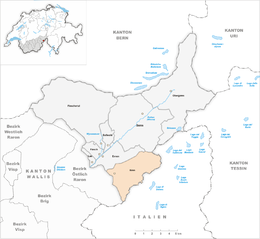Binn
| Binn | ||
|---|---|---|
 |
||
|
||
| Coordinates: 46°22′N 8°11′E / 46.367°N 8.183°ECoordinates: 46°22′N 8°11′E / 46.367°N 8.183°E | ||
| Country | Switzerland | |
| Canton | Valais | |
| District | Goms | |
| Government | ||
| • Mayor | Beat Tenisch | |
| Area | ||
| • Total | 65.03 km2 (25.11 sq mi) | |
| Elevation | 1,400 m (4,600 ft) | |
| Population (Dec 2015) | ||
| • Total | 145 | |
| • Density | 2.2/km2 (5.8/sq mi) | |
| Postal code | 3996 | |
| SFOS number | 6054 | |
| Surrounded by | Baceno (IT-VB), Ernen, Formazza (IT-VB), Grengiols, Reckingen-Gluringen | |
| Twin towns | Urtenen-Schönbühl (Switzerland), Arbon (Switzerland) | |
| Website |
www SFSO statistics |
|
Binn (Walser German: Bìi) is a municipality in the district of Goms in the canton of Valais in Switzerland.
The Binn valley is known for its rich mineral deposits, some types of which are unique to the area. The notable Lengenbach Quarry is in Binn.
Binn is first mentioned in 1297 as Buen, Buyn, Bun and Bondolun.
Binn has an area, as of 2011[update], of 65 square kilometers (25 sq mi). Of this area, 25.7% is used for agricultural purposes, while 16.9% is forested. Of the rest of the land, 0.4% is settled (buildings or roads) and 57.0% is unproductive land.
This village in the Swiss Alps is located at an elevation of 1,400 m (4,600 ft). It consists of the village of Schmidigehischere and the hamlets of Ze Binne, Wilere, Giesse and Fäld as well as part of the pilgrimage site of Heiligkreuz in the Leng valley.
Geisspfadsee and Züesee are located in the municipality.
The Lengenbach Quarry (LGB) is noted among the mineralogical community for its unusual sulfosalt specimens.
The mineralogy has been studied for nearly 200 years. Lengenbach is the type locality for 29 minerals.
The blazon of the municipal coat of arms is Azure, issuant from Coupeaux Vert a triple (papal) Cross Or between in Chief two Greek Crosses of the same.
Binn has a population (as of December 2015[update]) of 145. As of 2008[update], 2.7% of the population are resident foreign nationals. Over the last 10 years (1999–2009 ) the population has changed at a rate of -17.4%. It has changed at a rate of -22.1% due to migration and at a rate of 2.9% due to births and deaths.
...
Wikipedia



